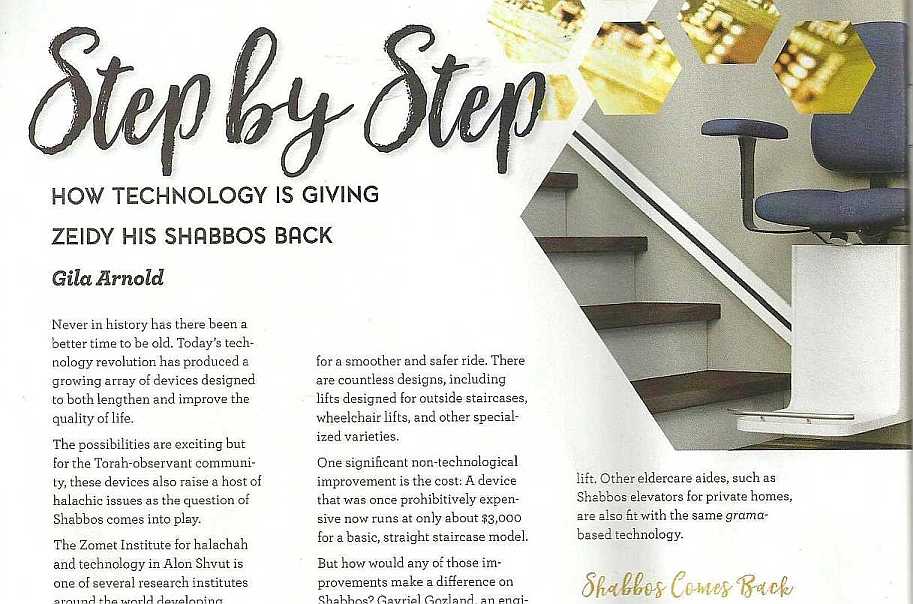For more than 30 years, the Zomet Institute of Gush Etzion in Israel has designed appliances for use on Shabbos using the approach of gromo, indirect causation. This approach was rejected by gedolei Yisroel and the Great poskim.
In 5745 (1985), the Steipler and HaRav Shach zt"l published a letter declaring:
"It is therefore obvious that according to da'as Torah
it is forbidden to use the heating tanks based on a
heter of gromo and likewise not the water heaters
that heat water up to less than yad soledes. It is
forbidden to use various utensils based on technological
heteirim of gromo and koach sheini, since
their common denominator is that they all wreck and uproot
the kedusha of Shabbos, and it is impossible to
foresee what the results will be. In such cases we are
commanded to make safeguards for the mitzvah.
"By making a safeguard around the Holy Torah we will be
privileged to have a Shabbos that will be a day of rest and
kedusha, a complete rest that HaKodosh Boruch Hu
desires."
As recently as Tishrei, 5777, HaRav Yitzchak Darzi, author of the sefer Shvus Yitzchak and a well-known
talmid of HaRav Eliashiv zt"l, addressed the topic in the halachic journal HaMoriah (35, p 302). We will not summarize the entire article but only a few key points.
The Terumas Hadeshen says that something that the sevoras halev says is forbidden cannot be permitted on Shabbos without a clear proof (ra'aya) that it is permissible. He also quotes HaRav Shamshon Rafael Hirsch (Shemos 20:10) as saying that the word "melochoh" is mentioned almost 200 times and it never refers to an act which involves physical toil, but rather to meleches machsheves that means a conscious and planned carrying out of a particular intention, and therefore the plain meaning of the prohibition of Shabbos is not to do melochoh meaning something that has this character.
HaRav Eliashiv zt"l said that doing some act using a device that works using gromo, or removing a barrier, or possible psik reisha and similar approaches, are absolute melcohos in the sense of the laws of Shabbos. This is because the fact that gromo and sofeik psik reisha and the like are absolved from punishment on Shabbos is only because the result is not meleches machseves meaning that it is not the result of the original intention of the one who did that act. However if an appliance is designed and built to do something in this manner, it is undoubtedly an absolute meleches machsheves.
HaRav Shlomo Zalman Auerbach zt"l said the same thing, as quoted in Shvus Yitzchak, volumes VI and XII.
HaRav Darzi discusses that we do not really know the full extent of hilchos Shabbos as seen in the Yerushalmi Shabbos (7:2) and therefore we must not permit anything unless we can find an unequivocal proof of its permissiveness, and even then we should solicit the agreement of other talmidei chachomim.
Although no items are mentioned, it is clear that HaRav Darzi is referring to the approach of the Zomet Institute, and that Institute makes abundantly clear in all its publications and promotions that gromo is the basis of its approach to many issues.
The issue was revived by a full-page article in Mishpacha Magazine (#627 11 Elul 5776, September 14, 2016) entitled, "Step by Step - How Technology is giving Zeidy His Shabbos Back." The article asks: "Who would have imagined a stair lift that is usable on Shabbos?" It goes on to explain that the stair lift in question, "incorporates Zomet Institute technology... based on the halachic principle of grama."
The article does caution, "that the halachic authorities only permit ShabbosLift use for people with a medical need," however there is no hint there or anywhere else in the article that important halachic authorities do not agree with the entire approach.
We thought that a publication with an audience like Mishpacha Magazine has a duty to inform its readers when the community's leading poskim oppose a product, and we sent in the following letter, intended to be informative and not argumentative in any way.
With regard to the above referenced article, readers should be advised that according to Shevus Yitzchak (Grama, Chapter 15, page 138 and following) and Orchos Shabbos (Chapter 29, On Machshirei Grama, paragraph 27, and the footnote there) the grama approach, and also removing a block, were rejected in their entirety by HaRav Yosef Sholom Eliashiv, HaRav Shlomo Zalman Auerbach and HaRav Moshe Feinstein zichronom livrocho, and also by HaRav Nissim Karelitz shlita.
HaRav Eliashiv is quoted as recommending that a telephone based on this technology not be used even by someone who needs to make a call due to pikuach nefesh. He should prefer a regular telephone.
Several rabbonim make the point that when a device is built by design to function in a certain way, it becomes the norm and is forbidden by the regular rules of meleches machsheves of Shabbos.
A device which incorporates "a built-in computer including speed and obstacle monitors and safety sensors" may raise other issues relating to digital technology that are relatively new and had not yet arisen in the lifetimes of HaRav Shlomo Zalman Auerbach and HaRav Moshe Feinstein.
Respectfully,
After waiting a few weeks and not seeing the letter printed we sent a copy to the email listed on the Rabbinical Authorities. However there was no response to that either.
Therefore, even though our audience is nowhere near as big as the audience that Mishpacha Magazine reaches, we decided to publish this article to inform those who are interested.
We did notice that there were subsequent advertisements of the Shabbos Lift in Mishpacha Magazine.

Part of the original article




